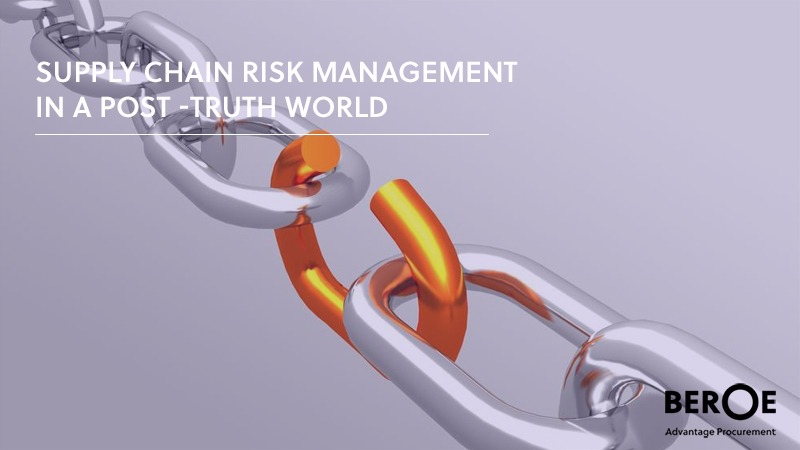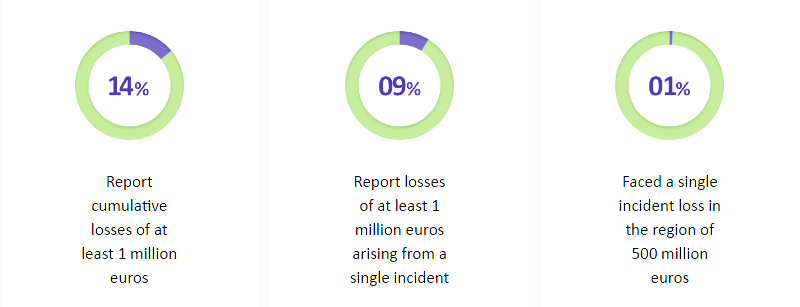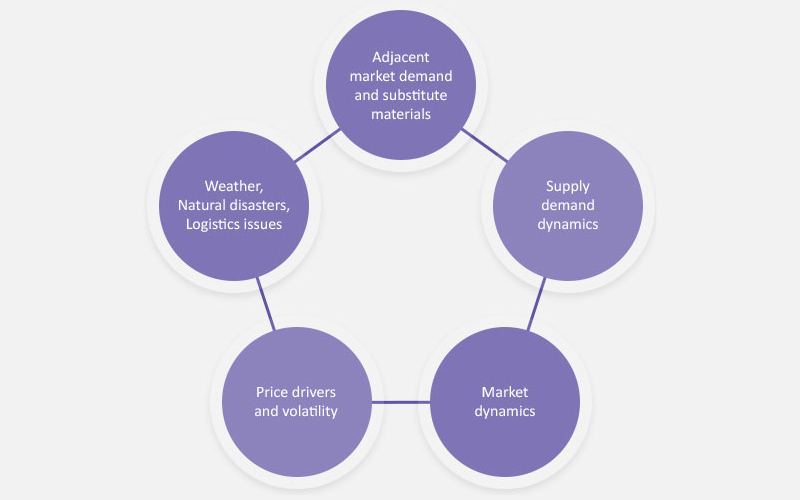
Supply chain risk management in a post-truth world

In collaboration with Praveen Dahiya -- Associate Vice President, Supply Chain Risk & Market Intelligence

The digital age has ushered in multitudes of information channels. Supply chain managers have to sift through mountains of data and information -- and over a period of time they may favor a few select channels of information. Such a selection creates the danger of online “echo chambers”, which reinforces existing beliefs and/or biases, making it tough to identify potential risks much beforehand. Or in other words, we are now experiencing “post-truth” phenomenon.
“Post-truth” was the Oxford English Dictionary’s word of the year in 2016 and it means “denoting circumstances in which objective facts are less influential in shaping public opinion than appeals to emotion and personal belief”.
In its Global Risk Report for 2017 prepared by the World Economic Forum, Walter Quattrociocchi of Northeastern University highlights the danger of fake news or false information.
“Social media’s power to misinform, manipulate and distort public opinion has become severe. Experimental evidence shows that confirmatory information is accepted even if it contains deliberately false claims, while dissenting information is mainly ignored or might even increase group polarization,” Quattrociocchi said.
Access to reliable information is the key to an effective as well as robust risk management practice. And there exists a danger of getting caught up in a web of misinformation or self-fulfilling echo chambers. This was evident when pollsters and mainstream media failed to accurately predict the outcome of Brexit vote and U.S. presidential elections. Such are the challenges posed by new-age information channels where misinformation and biases spread at lightning speed.
The choice of information channels have an impact on supply chain risk management: 78 percent of the Fortune 500 companies source raw materials globally. Combine this with practices like lean management that have led to reduction in inventories and rise in unpredictable weather events, one gets the need for a reliable information source in managing supply chain risk.
However, people continue to be ambivalent over their choice of information channel. More often than not, familiarity of an information source trumps over its inherent trustworthiness. This is demonstrated by the fact that despite the rise of automation and availability of information, nearly one-third of companies around the world have not analyzed their full supply chain to identify original source of disruption.
Typical causes of supply chain disruption
(multiple answers were allowed)
50%
Immediate supplier (Tier 1)
21%
Supplier's supplier (Tier 2)
08%
Much lower down the
supply chain
31%
Not analysed the full supply chain
to identify original source of
disruption
Impact of supply chain disruptions

Besides the power of misinformation, organizations also have had to deal with product recalls and natural disasters that are periodically causing supply disruptions. No company would want to experience disruptions to their supply chains as it has wide ramifications.
Need for an Independent arbitrator
Supply chains of various industry verticals are already facing challenges such as rising bankruptcies, debt overload, economic uncertainty, geopolitical uncertainty and dodgy consumer demand.
To cope with such shape-shifting scenarios, companies have begun to rely on software tools that would help them with some aspects of supply chain risk management. While listing out tier 1, 2 and 3 suppliers, these tools merely act as repositories of supplier risk and offer no actionable insights.
The foremost challenge is who will provide the necessary information and insight to power these tools? And who will input all relevant, vetted information into these tools? Who will remove false information as well as pick out the relevant piece of information from deluge of data? In short, who will "program manage" these functions? Most information that goes into these tools is voluntarily disclosed by the suppliers themselves. And some of them are fed by the companies. But how many suppliers actually comply? The ball park figure is about 50 percent. The question to be asked is how many of those suppliers who have not given sufficient information is actually critical to the company's supply chain? Many of these questions usually go unanswered, which amplifies the potential risks.
The tool may provide the financial numbers of the supplier. But it won't offer key insights as to whether the raw material that is critical to the buyer is actually integral to the supplier's business. A particular raw material could be vital to the company's supply chain -- but if it isn't a central product to the supplier then there is always a possibility of a supply disruption. The software tool doesn't necessarily spell out such complex relationships.
In this age of information overload, even the risk management tools are in the danger of becoming online echo chambers -- an over reliance on them is not a good idea because of the absence of effective feedback loop. In order to avoid such a scenario, supply chain risk managers would need access to a third-party risk information provider who will act as an independent arbitrator for providing unbiased and timely information to prevent disruptions.
The intelligence partner should not only analyze the supply chain in isolation but also the entire ecosystem for meaningful results. The independent arbitrator will interpret information relating to:
1. Adjacent market demand and substitutes
2. Supply demand dynamics
3. Market dynamics
4. Price drivers and volatility
5. Weather, natural disasters and logistics issues

By triangulating information flow from all of the above nodes, the independent arbitrators will be able to provide timely, relevant risk alerts to supply chain managers. This will ensure not getting stuck into echo chambers or falling prey to self-fulfilling prophecy because mere availability of data and peer opinion doesn’t guarantee a favorable outcome. What matters is emotion-free interpretation of the data in a timely manner: that’s how one can deftly manage supply chain risk in the post-truth world.
Related Insights:
View All
Get more stories like this
Subscirbe for more news,updates and insights from Beroe







